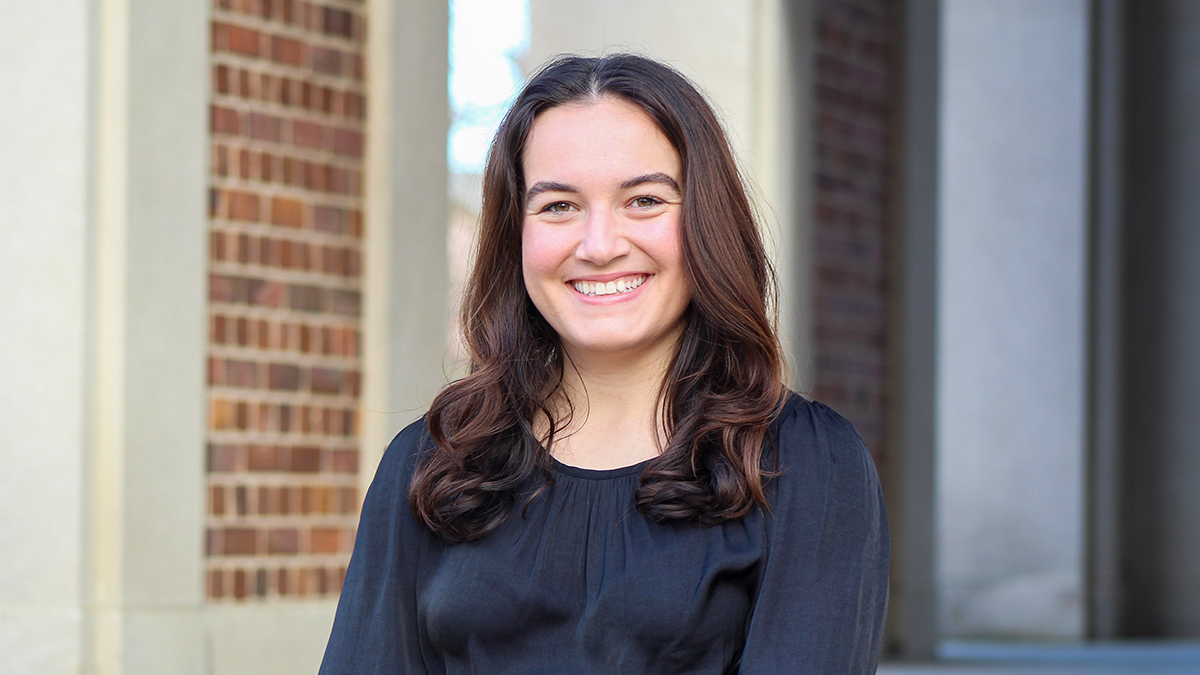Creating a buzz on campus
Carolina has been named a Bee Campus USA affiliate, joining more than 60 other universities working to improve their ornamental landscapes to sustain pollinators. The distinction recognizes the collective strength of educational campuses nationwide to benefit pollinators.
It began nearly two years ago with a cluster of hungry honeybees swirling around a campus trash can.
That sight reminded Bryn Walker, then a first-year student, that she had intended to look into Carolina’s Beekeeping Club, one of the University’s 800 student organizations, even before she arrived on campus.
“It’s something I had never explored before coming here, and I thought it sounded interesting,” she said, “but I got so busy once I was on campus that I had forgotten about the club.”
As a result of that aha moment on a fall day in 2017, Walker became actively involved in the club and gained an appreciation of the environmental importance of beekeeping. In the process, she also found a meaningful place for herself on a large campus.
Ultimately, that experience led to Carolina being named a Bee Campus USA affiliate this spring.
The distinction, given by the international nonprofit Xerces Society for Invertebrate Conservation, recognizes the collective strength of educational campuses nationwide to benefit pollinators. Carolina has joined more than 60 U.S. campuses working to improve their ornamental landscapes to sustain pollinators.
With a variety of campus resources to support pollinator habitats already in place – from the North Carolina Botanical Garden, with its focus on conservation, to the multi-level sustainability efforts of the University’s Three Zeros Environmental Initiative – Walker thought it seemed natural for the University to apply for Bee Campus USA status.
Last summer, she submitted a suggestion through the sustainability website that the University should create a pollinator garden.
She received an immediate response from Lew Kellogg, executive director of Energy Services, which includes the Sustainability Office and the Three Zeros Environmental Initiative. He described the pollinator habitat already planned for the new state-of-the-art solar farm to be built on the former Horace Williams Airport property. Guided by the expertise of North Carolina Botanical Garden staff, the habitat will include a variety of plantings native to North Carolina, including black-eyed Susan, butterfly milkweed and spotted beebalm – all chosen to attract bees, butterflies and other pollinators.
“I thought that was pretty impressive,” said Walker, now a sophomore and secretary of the Beekeeping Club, slated to become next year’s president. “So, Nissa Coit (current club president) and I started talking about how cool it would be to be named a Bee Campus. That seemed like a natural extension of UNC’s many sustainability efforts.”
University administrators agreed, and the application was submitted the first of the year. The Bee Campus USA designation was awarded at the beginning of February, said Amy Armbruster, Three Zeros project manager, who credited the two young women with keeping the momentum for the effort going.
Honeybees are nature’s work force. “They are the poster pollinators for an incredible diversity of all that we rely on for pollination,” said Damon Waitt, director of the North Carolina Botanical Garden.
Insect pollination accounts for one in three bites of food we eat, and 90% of all flowering plants depend on cross-pollination. Bees pollinate a wide cross-section of food, from almonds to strawberries, cucumbers and pumpkins, and even the alfalfa needed to feed dairy cows.
Pollinators have been in peril for the past few decades, Waitt explained. Their habitats have been reduced dramatically as natural areas are urbanized or developed for highways or power line right-of-ways. Restoring urban pollinator habitats in these spaces is the impetus behind programs like the Xerces Society’s Bee Campus USA and Bee City USA.
Not any type of flowering plant fits the bill, though. “All nectar is not equal, and pollen differs from one species to the next in its nutritional value,” Waitt said. “Matching the right plants to benefit our local pollinators is really important, and the Botanical Garden can play a key role in recommending what natives to plant.”
The Bee Campus USA designation includes a significant educational component, including pollination workshops and student-learning opportunities as well as signage for pollinator habitats, much of which was already in place or in the works at Carolina.
For example, through a grant from Burt’s Bees, the North Carolina Botanical Garden is finalizing a pollinator toolkit for North Carolina, which Heather Summer, collections manager and seed program coordinator, began developing last summer.
Designed to be a one-stop-shop for enhancing pollinator habitats across the state, the toolkit provides guidance for site preparation and selection of the appropriate species and seed mixes for a particular project based on the ecosystem in which it will be developed. Ultimately, the toolkit will be posted on the website of the N.C. Pollinator Conservation Alliance, a group that includes the North Carolina Botanical Garden.
The pollinator habitat planned for the University’s new solar array project will provide a complementary research opportunity.
Creating large gardens of native plantings beneath and around solar panels to attract pollinators is not commonplace in North Carolina, so trying different mixes for Carolina’s solar farm to see what works best will provide useful information statewide, said Waitt, who has worked with the National Renewable Energy Lab and others on pollinator-friendly plantings for solar farms.
Choosing the right mix of native species is fairly complex, he said: “It would be much easier to plant a monoculture of clover, but that would be like feeding pollinators pizza every day instead of a well-balanced diet.”
Because native plants can take a while to become established, it will be two to three years after planting before the solar farm really looks like a pollinator habitat, Summer said.
That’s time well spent, Kellogg believes.
“Sustainability is multi-tiered. It involves reducing energy consumption and limiting wastewater runoff, and it also includes finding ways to promote biodiversity through activities like beekeeping and cultivating pollinator habitats,” he said.
Kellogg had already paved the way for the Beekeeping Club to move its beehive to the FedEx Global Education Center’s sunny garden roof, and a second hive has just been added there. Down the road, the club hopes to locate additional hives at the solar farm.
It’s all part of Carolina’s aim to play a significant role in sustainability wherever possible.




